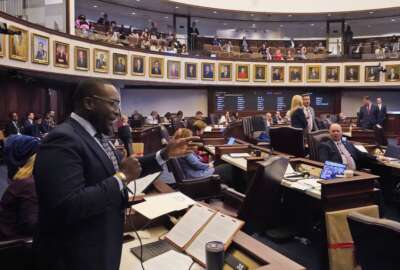Hubbard Radio Washington DC, LLC. All rights reserved. This website is not intended for users located within the European Economic Area.
Air Force offers medical, legal help as states clamp down on trans and LGBTQ+ children
In light of recent state laws criminalizing parents and doctors who help transgender children take steps to affirm their gender, and other legislation banning official talk about sexual orientation in schools, the Department of the Air Force is offering support to those living in affected communities.
The resources are a rare step where the Air and Space Forces recognize a hostile environment created by governments in states where the services often send their troops.
Many...
In light of recent state laws criminalizing parents and doctors who help transgender children take steps to affirm their gender, and other legislation banning official talk about sexual orientation in schools, the Department of the Air Force is offering support to those living in affected communities.
The resources are a rare step where the Air and Space Forces recognize a hostile environment created by governments in states where the services often send their troops.
Many of the laws and directives, which dissenters call discriminatory, are in more conservative states where the Air and Space Forces have bases including Texas, Alabama and Florida.
“The health, care and resilience of our DAF personnel and their families is not just our top priority — it’s essential to our ability to accomplish the mission,” said Air Force Undersecretary Gina Ortiz Jones. “We are closely tracking state laws and legislation to ensure we prepare for and mitigate effects to our airmen, guardians and their families. Medical, legal resources, and various assistance are available for those who need them.”
The release tells airmen and guardians that if they or their families need help they should start with military health clinics and hospitals.
Another resource, according to the statement, is the Exceptional Family Member Program, which assists families with special needs in medical, legal and educational support.
The Department of the Air Force is also encouraging troops to go to installation legal offices as another means of free support in navigating new laws.
It is not often that the military services’ personnel departments get involved with local laws.
Former Army personnel chief Tammy Smith told Federal News Network that the military offered assistance right after the appeal of Don’t Ask Don’t Tell, a policy where LGBTQ+ service members were not allowed to serve openly.
The Army also provided advice to LGBTQ+ service members before same sex marriage was legal nationally, who were going to states where marriage was legal to wed, and then returning to the state where they resided where it wasn’t legal.
The laws have been controversial even within the Republican party, the predominant political entity introducing the bills.
On Tuesday, Utah Governor Spencer Cox became the second governor in the past week to veto a bill barring transgender athletes from competing girls’ sports. Cox stated his chief concerns were the mental health impacts the bill could have on children.
“I want them to live,” Cox said.
Smith pointed out DoD’s interest in these laws in talking about a new Texas directive that classifies gender affirming treatments for transgender children as child abuse.
“The Defense Department must recognize that the involuntary transfer of service members to Texas places parents of transgender dependent children in peril,” she said. “They may be charged with child abuse by Texas authorities. This impacts not only assignments but professional schooling like the Army Sergeants Major Academy.”
Todd Weiler, former assistant Defense secretary for Manpower and Reserve Affairs and managing partner at Blue Rose Consulting, said the Air Force’s move is good management.
“This is what strong leadership looks like. I have never run into something like what we are experiencing now: local- and state-sanctioned discrimination,” he said. “It is reprehensible and it falls on federal entities, like the Air Force, and commercial businesses to protect the equality of our people.”
Transition for transgender children mostly refers to taking medications that delay puberty. Those medications are extensively studied and are completely reversible, according to the Journal of the Endocrine Society.
Those medications have also shown a reduction in mental health issues for transgender children.
According to the Trevor Project’s annual survey of LGBTQ+ youth mental health, 52% of transgender and nonbinary children contemplated killing themselves in 2020, and 42% of LGBTQ+ youth considered taking their lives.
Three-quarters of those children reported discrimination based on their sexual orientation or gender, and 94% reported recent politics negatively impacted their mental health.
Authors of bills claim that transgender youths are hurting sports or that the medical procedures are “radical social experimentation,” as one Florida state representative put it. However, leading health organizations like the American Medical Association say that empirical evidence shows that transgender and nonbinary identities are normal variations of human identity and expression.
Scott Maucione
Scott Maucione is a defense reporter for Federal News Network and reports on human capital, workforce and the Defense Department at-large.
Follow @smaucioneWFED
Related Stories
On DoD

WEDNESDAYS, 11 A.M. & 2 P.M.
Each week, Defense Reporter Jared Serbu speaks with the managers of the federal government's largest department. Subscribe on PodcastOne or Apple Podcasts.





